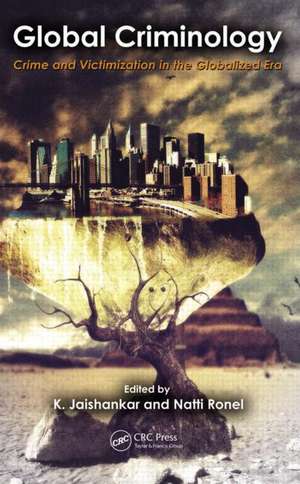Global Criminology: Crime and Victimization in a Globalized Era
Editat de K. Jaishankar, Natti Ronelen Limba Engleză Hardback – 25 mar 2013
Four dominant themes emerged at the conference:
Terrorism. In a topic that operates at the intersection of international law, international politics, crime, and victimization, some questions remain unanswered. Is terrorism a crime issue or a national defense issue? Should terrorists be treated as war criminals, soldiers, or civil criminals? How can international efforts and local efforts work together to defeat terrorism?
Cyber Crimes and Victimization. Cyber space provides anonymity, immediate availability, and global access. Cyber offenders easily abuse these open routes. As cyber space develops, cyber-crime develops and grows. To achieve better cyber security, global criminologists must explore cyber-crimes from a variety of perspectives, including law, the motivation of offenders, and the impact on victims.
Marginality and Social Exclusion. Globalization is manifest in the fast transition of people between places, societies, social classes, and cultures. Known social constructions are destroyed for new ones, and marginalized people are excluded from important material, social, and human resources. This section examines how we can provide inclusion for marginalized individuals in the global era and protect them from victimization.
Theoretical and Practical Models of Criminal Victimization.
The process of globalization, as mentioned above, creates new elements of victimization. But globalization can also become an opportunity for confronting and defeating victimization through improved sharing of knowledge and increased understanding of the humanity of the weak.
The emerging global criminology comprises diversity of attitudes, explanations, and perspectives. The editors of this volume recognize that in the global village, there is room for solid contributions to the field of criminology and criminal justice. This collection is a move in this direction. It is hoped that these articles will help to expand the boundaries of criminology, criminal justice, and victimology with a view towards reducing crime worldwide.
Preț: 827.47 lei
Preț vechi: 1034.34 lei
-20% Nou
Puncte Express: 1241
Preț estimativ în valută:
158.35€ • 165.12$ • 131.61£
158.35€ • 165.12$ • 131.61£
Carte tipărită la comandă
Livrare economică 20 martie-03 aprilie
Preluare comenzi: 021 569.72.76
Specificații
ISBN-13: 9781439892497
ISBN-10: 1439892490
Pagini: 414
Ilustrații: 6 b/w images and 29 tables
Dimensiuni: 156 x 234 x 30 mm
Greutate: 0.73 kg
Ediția:1
Editura: Taylor & Francis
Colecția Routledge
Locul publicării:Oxford, United Kingdom
ISBN-10: 1439892490
Pagini: 414
Ilustrații: 6 b/w images and 29 tables
Dimensiuni: 156 x 234 x 30 mm
Greutate: 0.73 kg
Ediția:1
Editura: Taylor & Francis
Colecția Routledge
Locul publicării:Oxford, United Kingdom
Public țintă
Criminologists, sociologists, psychologists, legal academics, educationists and students of criminal justice, sociology, law, education, and psychology.Cuprins
Terrorism. How Nonstate Are Terrorist Groups in Pakistan? Analysis of State Responsibilities and Accountability. Sea (Maritime) Piracy in the Southern African Development Community Region. The Responsibility to Protect from Terror: Putting an End to Unilateral Misuse of the Precautionary Principle. Terrorist Financing in Southern Africa: African Commitment to Combating Terrorism. Cyber Crimes and Victimization. Use of Electronic Evidence in South African Law: Embracing Technical Change. Hacking and Fraud: Qualitative Analysis of Online Offending and Victimization. Cyber Victimization in India: Preliminary Study. Arabic Muslim Hackers: Who Are They and What Is Their Relationship with Islamic Jihadists and Terrorists?. Sexual Harassment over Cell Phones: A Survey of Women in Dhaka City. Marginality and Social Exclusion. Community Reentry from Jail for Mentally Ill Offenders: Challenges of Program Implementation. Locked In and Locked Out: Global Feminist Perspectives on Women and Imprisonment. Criminalization of Beggary: A Critical Look at the Indian Legal Approach. It Is Crime, Not Racism: Victimization of Indian Students in Australia. Forced Displacement and Its Implications for Youths’ Distress and Posttraumatic Growth. Theoretical and Practical Models of Criminal Victimization. Forced Marriages, Bride Price, Levirate, and Domestic Violence: Victimization of Women and Struggles for Justice and Equity in Selected African Countries. Beguiling Eve and Her Innocent Counterpart: Victim-Offender Identities in the Criminal Justice Process. Extending the Logic of Functional Explanations: A Theoretical Model to Explain the Victimization Process during an Indian Witch Hunt. From Criminal Spin to Positive Criminology. Intimate Partner Violence Victimization: Perspectives from Spouses of Alcohol Dependents.
Notă biografică
K. Jaishankar, Ph.D., is a senior assistant professor in the Department of Criminology and Criminal Justice, Manonmaniam Sundaranar University, Tirunelveli, Tamil Nadu, India and President of the South Asian Society of Criminology and Victimology (SASCV). He was a Commonwealth Fellow (2009–2010) at the Centre for Criminal Justice Studies, School of Law, University of Leeds, UK.
Natti Ronel, Ph.D., is an associate professor in the Department of Criminology, Bar-Ilan University, Ramat Gan, Israel. He is also a licensed clinical criminologist who has a private practice with the criminal population, youth, and adults who exhibit addiction, violence, and/or victimization. He leads training courses for criminal justice and victim assistance professionals.
Natti Ronel, Ph.D., is an associate professor in the Department of Criminology, Bar-Ilan University, Ramat Gan, Israel. He is also a licensed clinical criminologist who has a private practice with the criminal population, youth, and adults who exhibit addiction, violence, and/or victimization. He leads training courses for criminal justice and victim assistance professionals.
Descriere
Global criminology is an emerging field covering international and transnational crimes that have not traditionally been the focus of mainstream criminology or criminal justice. This volume is a collection of peer-reviewed papers presented at the First International Conference of the South Asian Society of Criminology and Victimology (SASCV) in Jaipur, India in 2011. The book’s four dominant themes are terrorism, cyber crimes and victimization, marginality and social exclusion, and theoretical and practical methods of criminal victimization. The editors’ goal is to expand the boundaries of criminology, criminal justice, and victimology with a view towards reducing crime worldwide.












